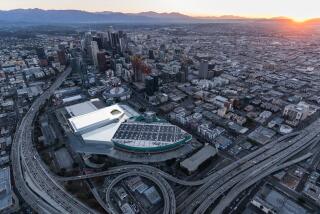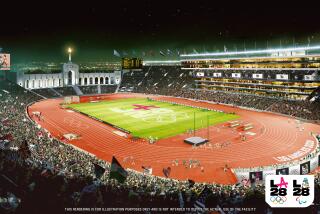N.Y. Tries to Get Back in the Game
- Share via
In an abrupt turn that changes the baseball landscape in New York even as it perhaps revives the city’s bid for the 2012 Summer Olympics, officials announced plans Sunday for the construction of a stadium for the Mets in Flushing Meadow and said it would be converted to an Olympic stadium if New York wins the Games.
The Mets’ park, to be built in the parking lot next to Shea Stadium, the team’s current facility, would open for play in 2009, officials said. The team would play there for three years, then -- if New York wins the 2012 Games -- go elsewhere for a year, perhaps Yankee Stadium, so the park could be turned into an Olympic stadium. In 2013 the Mets would again play in the new park.
The stadium is expected to cost more than $600 million, paid for by the Mets. The conversion from a 45,000-seat baseball stadium to an 80,000-seat Olympic facility, and back again to a baseball park, is due to cost about $250 million; the city and state of New York would split expenses over $142.5 million available to a New York Games organizing committee, meaning about $50 million apiece.
The announcement Sunday capped three days of behind-the-scenes deal-making sparked by the demise last week of the financing plan for a $2.2-billion proposal for a stadium on the far West Side of Manhattan, the planned home of the NFL’s New York Jets and for years the centerpiece of the city’s Olympic bid.
The International Olympic Committee will choose the 2012 host city July 6 at an assembly in Singapore. Paris, London, Madrid and Moscow are also in the race.
“It wasn’t our first choice,” New York Mayor Michael R. Bloomberg said at a Sunday night news conference at City Hall, referring to the Flushing Meadow plan. But, he said, “It sure is a good alternative.”
U.S. Olympic Committee officials issued a statement asserting that the New York bid is “very much alive.”
Paris has long been considered the 2012 front-runner, though New York -- at least until the West Side stadium plan collapsed -- had quietly been making steady progress, led by bid chief and Deputy Mayor Dan Doctoroff’s personal touch in one-on-one campaigning.
“While we may still be an underdog, it really demonstrates New York’s commitment to all of this,” Doctoroff said in a telephone interview Sunday. “It would have been an easy thing to suffer the blow we did last week, pack it in and say, ‘We don’t have an alternative.’ In fact, we didn’t have an alternative.
“But we worked very quickly. Everyone pulled together. And that’s what New Yorkers do.”
The Mets and the Yankees have been seeking new facilities for years. An announcement about a new Yankee stadium is likely in the coming days, officials said Sunday night.
“We spent years planning what we wanted to do,” Fred Wilpon, the Mets’ chairman and chief executive, said at the City Hall news conference. “It’s all come together in the last week.”
The Yankees’ new stadium, as detailed previously in New York newspaper accounts, would go up in Macombs Dam Park, across 161st Street from Yankee Stadium. The new park would be designed to evoke the style of the original Yankee Stadium, opened in 1923 and forever enshrined in American sports lore as the House That Ruth Built. When the current facility underwent a major renovation in 1974 and ‘75, the Yankees played in Shea Stadium.
The West Side football and Olympic stadium plan called for $300 million in state underwriting; it was that component that led to its doom. But the state politicians who last Monday vowed to veto the West Side plan, ensuring its defeat, have committed to the Mets’ facility, Bloomberg said Sunday.
Though the Mets’ new park is to be privately financed, the city and state agreed to underwrite needed infrastructure, the city $105 million, the state $75 million. The area is now littered with auto junkyards. The Olympic Stadium in Sydney, Australia, site of the 2000 Summer Games, was built on a former slaughterhouse and also demanded extensive pre-construction cleanup.
A new Yankee stadium could expect similar contributions from the city and state, officials said.
Construction on a new Met stadium will go forward whether New York wins the 2012 Olympics or not, Doctoroff said.
Bloomberg, Doctoroff and others had said for years that the West Side plan was central to the Olympic bid. The stadium was envisioned as the key to the expansion of New York’s undersized convention center.
Asked why officials hadn’t included a Plan B in Flushing Meadow years ago, with the launch of the Olympic bid, Bloomberg and Doctoroff said the West Side seemed like the better option -- one that Bloomberg in particular asserted would mean jobs and serve as the key to West Side development.
In addition, the organizing committee budget didn’t have the hundreds of millions of dollars it would have taken to convert “whatever facility it was into an Olympic stadium and back,” Doctoroff said.
And as for an alternative in Flushing Meadow, he said, “This was inconceivable but for the defeat we suffered on the West Side,” which triggered talks with the Mets.
On Thursday, the IOC gave New York bid leaders the OK to submit an alternate stadium plan. The Mets were called that afternoon, Doctoroff said. “That night, architectural and engineering teams were at work,” he said.
Said Wilpon: “The city had to move quickly ... and we were willing to do so.”
The IOC expected a response by today. Its executive board is now due to review the revised proposal.
An Olympic Stadium in Flushing Meadow has the effect of creating a massive Olympic park that rivals London’s plan for 2012 -- which has been based on grouping most of the Games’ action in one locale. Sydney used the same concept in 2000.
The Flushing Meadow complex in New York also would include press centers and venues for such sports as tennis, archery and rowing.
More to Read
Go beyond the scoreboard
Get the latest on L.A.'s teams in the daily Sports Report newsletter.
You may occasionally receive promotional content from the Los Angeles Times.






